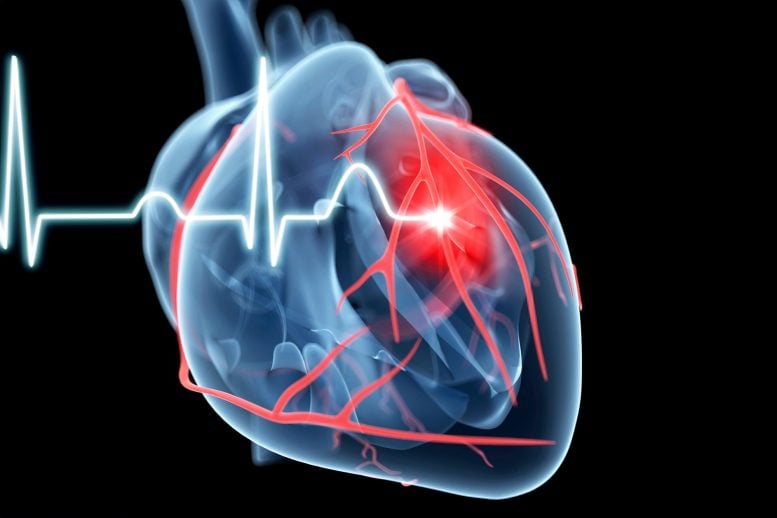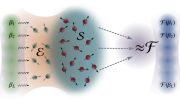
Recent research presented at the American Heart Association’s 2024 sessions found that individuals adhering to an 8-hour time-restricted eating plan had a significantly higher risk of cardiovascular mortality compared to those eating over longer periods.
Research Highlights:
- A study of over 20,000 adults found that those who followed an 8-hour time-restricted eating schedule, a type of intermittent fasting, had a 91% higher risk of death from cardiovascular disease.
- People with heart disease or cancer also had an increased risk of cardiovascular death.
- Compared with a standard schedule of eating across 12-16 hours per day, limiting food intake to less than 8 hours per day was not associated with living longer.
An analysis of over 20,000 U.S. adults found that people who limited their eating across less than 8 hours per day, a time-restricted eating plan, were more likely to die from cardiovascular disease compared to people who ate across 12-16 hours per day, according to preliminary research presented at the American Heart Association’s Epidemiology and Prevention│Lifestyle and Cardiometabolic Scientific Sessions 2024, March 18- 21, in Chicago. The meeting offers the latest science on population-based health and wellness and implications for lifestyle.
Understanding Time-Restricted Eating
Time-restricted eating, a type of intermittent fasting, involves limiting the hours for eating to a specific number of hours each day, which may range from a 4- to 12-hour time window in 24 hours. Many people who follow a time-restricted eating diet follow a 16:8 eating schedule, where they eat all their foods in an 8-hour window and fast for the remaining 16 hours each day, the researchers noted. Previous research has found that time-restricted eating improves several cardiometabolic health measures, such as blood pressure, blood glucose, and cholesterol levels.
Research Findings and Implications
“Restricting daily eating time to a short period, such as 8 hours per day, has gained popularity in recent years as a way to lose weight and improve heart health,” said senior study author Victor Wenze Zhong, Ph.D., a professor and chair of the department of epidemiology and biostatistics at the Shanghai Jiao Tong University School of Medicine in Shanghai, China. “However, the long-term health effects of time-restricted eating, including risk of death from any cause or cardiovascular disease, are unknown.”
Study Details and Limitations
In this study, researchers investigated the potential long-term health impact of following an 8-hour time-restricted eating plan. They reviewed information about dietary patterns for participants in the annual 2003-2018 National Health and Nutrition Examination Surveys (NHANES) in comparison to data about people who died in the U.S., from 2003 through December 2019, from the Centers for Disease Control and Prevention’s National Death Index database.
The analysis found:
- People who followed a pattern of eating all of their food across less than 8 hours per day had a 91% higher risk of death due to cardiovascular disease.
- The increased risk of cardiovascular death was also seen in people living with heart disease or cancer.
- Among people with existing cardiovascular disease, an eating duration of no less than 8 but less than 10 hours per day was also associated with a 66% higher risk of death from heart disease or stroke.
- Time-restricted eating did not reduce the overall risk of death from any cause.
- An eating duration of more than 16 hours per day was associated with a lower risk of cancer mortality among people with cancer.
“We were surprised to find that people who followed an 8-hour, time-restricted eating schedule were more likely to die from cardiovascular disease. Even though this type of diet has been popular due to its potential short-term benefits, our research clearly shows that, compared with a typical eating time range of 12-16 hours per day, a shorter eating duration was not associated with living longer,” Zhong said.
“It’s crucial for patients, particularly those with existing heart conditions or cancer, to be aware of the association between an 8-hour eating window and increased risk of cardiovascular death. Our study’s findings encourage a more cautious, personalized approach to dietary recommendations, ensuring that they are aligned with an individual’s health status and the latest scientific evidence,” he continued. “Although the study identified an association between an 8-hour eating window and cardiovascular death, this does not mean that time-restricted eating caused cardiovascular death.”
Study details and background:
- The study included approximately 20,000 adults in the U.S. with an average age of 49 years.
- Study participants were followed for a median length of 8 years and maximum length of 17 years.
- The study included data for NHANES participants who were at least 20 years old at enrollment, between 2003-2018, and had completed two 24-hour dietary recall questionnaires within the first year of enrollment.
- Approximately half of the participants self-identified as men, and half self-identified as women. 73.3% of the participants self-identified as non-Hispanic white adults, 11% self-identified as Hispanic adults, 8% self-identified as non-Hispanic Black adults and 6.9% of adults self-identified as another racial category, including mixed-race adults and adults of other non-Hispanic races.
The study’s limitations included its reliance on self-reported dietary information, which may be affected by participant’s memory or recall and may not accurately assess typical eating patterns. Factors that may also play a role in health, outside of daily duration of eating and cause of death, were not included in the analysis.
Future research may examine the biological mechanisms that underly the associations between a time-restricted eating schedule and adverse cardiovascular outcomes, and whether these findings are similar for people who live in other parts of the world, the authors noted.
Expert Perspectives and Future Research Directions
“Overall, this study suggests that time-restricted eating may have short-term benefits but long-term adverse effects. When the study is presented in its entirety, it will be interesting and helpful to learn more of the details of the analysis,” said Christopher D. Gardner, Ph.D., FAHA, the Rehnborg Farquhar Professor of Medicine at Stanford University in Stanford, California, and chair of the writing committee for the Association’s 2023 scientific statement, Popular Dietary Patterns: Alignment with American Heart Association 2021 Dietary Guidance.
“One of those details involves the nutrient quality of the diets typical of the different subsets of participants. Without this information, it cannot be determined if nutrient density might be an alternate explanation to the findings that currently focus on the window of time for eating. Second, it needs to be emphasized that categorization into the different windows of time-restricted eating was determined on the basis of just two days of dietary intake,” he said.
“It will also be critical to see a comparison of demographics and baseline characteristics across the groups that were classified into the different time-restricted eating windows – for example, was the group with the shortest time-restricted eating window unique compared to people who followed other eating schedules, in terms of weight, stress, traditional cardiometabolic risk factors or other factors associated with adverse cardiovascular outcomes? This additional information will help to better understand the potential independent contribution of the short time-restricted eating pattern reported in this interesting and provocative abstract.”









Seems like a very low quality study, eager to report any results!
No causal connection established, only unreliable correlation as always. No hypothesis or clue on the possible mechanism of the suggested relation.
Naturally people with existing cardiovascular disease will also be consuming a lot more CVD-related drugs, so if an study looked for correlation there, it would also find correlation between CVD-related deaths and the medications! Which is obviously absurd because we have the causal relationship backwards! The problem is, this absurdity is not always obvious.
True, it’s just a big-data study of a database, using self-reported eating habits, which are usually wrong. Also it’s by the AHA, and their past advice has often been counterproductive. Still, inductive correlations are how science develops, and the study has a large sample population, plus the study itself is….wait, where is the study?
I have study that completely contradicts the conclusions in this article, but I’ll not link it or even name of the study. But don’t worry, “When the study is presented in its entirety, it will be interesting and helpful”. Instead, please read the only link I provide, my irrelevant “2023 scientific statement” of my “2021 Dietary Guidance”.
I didn’t click their “Alignment with American Heart Association 2021 Dietary Guidance”; does it still say to replace fat with heart-healthy sugar?
Call me when they actually release a study I can be impressed by, or sardonically criticize. In the meantime, I’ll just cite the AHA’s November 18 2021 “Intermittent fasting may protect the heart by controlling inflammation”, their November 25 2019 “Regular fasting could lead to longer, healthier life”, and their March 5th 2024 advice “Fasting at Ramadan while keeping health in mind” which recommends fasting because it “can be done in a way that enhances health” and “Historically, it’s been proven over and over again that fasting is actually very safe”. I assume those only apply if you’ve not been 91% more killed by their previous advice.
How can this be true surely resting the body as in the heart will have more benefits for your body has ot not been written that our ancestors the hunters and gatherers would have eaten like this it has been called the caveman diet after all?
Easily. Life expectancy made a 30 year old caveman elderly. Maybe fasting increases cardiac inflammation. Or the heart is more sensitive to a circulating electrolyte or nutrient level than maybe we thought. The added psychological stress of hunger could manifest physiologically as circulatory system damage over time. Or maybe it’s simply not true at all. We don’t know, because the study didn’t look for reasons, only a correlation between the CDC’s National Death Index database and the self-reported diet habits in the NHANES survey, and there is no study yet anyway. All we can do is make uncertain guesses.
Sadly, despite my even having written the AHA a couple of times, mainstream medicine remains in the ‘dark-ages,’ with any gains being primarily in the forms of high-tech ‘blood-letting’ and ‘potions.’ What makes the study even less reliable is the too-typical omission of Dr. Arthur F. Coca’s (by 1935; my) kind of food (minimally) allergy reactions, FDA approved food poisoning (since the late 1960s; namely soy and MSG; others) and excessive related/resultant medical errors. What makes intermittent fasting work is that my kind of practically harmless single-single-substance allergy reactions (producers of only very mild inflammation) spontaneously resolve in about six to twelve hours. But, they are easily provoked to become chronic and deadly dangerous long-term (months to decades; highly individual) through dosing with multiple allergens, too-soon repeated dosing, too-short of intervals between dosing with other allergens and/or dosing with FDA approved toxic food additives. In particular, added artificially cultured “free” (can cross the blood-brain barrier) MSG can extend and/or intensify basically harmless individual allergy reactions to turn them chronic. Retrospectively, the NHANES studies are questionable (at best) and/or invalid (at worst).
People who follow intermittent fasting tend to eat fewer meals than people who don’t. But eating one or two meals a day makes it more difficult for the average person to consume the recommended fibre, fruit and vegetables compared to those who eat 3 or 4 meals a day. Fewer of these important nutrients is likely to blame for the increase in heart disease.